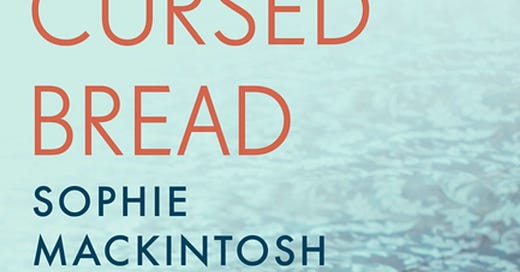In her brief afterword to Cursed Bread, Sophie Mackintosh tells of a small French town that, in the early 1950s, succumbed to a mass poisoning. The case has never been solved. It’s this historical curio that serves as inspiration for Mackintosh’s tale of lust, obsession and murder. Elodie is the baker’s wife. Trapped in a sexless marriage, she watches his powerful hands knead the dough, and fantasises about what could be. When they attend a party to welcome a new ambassador, Elodie almost immediately becomes fixated on Violet, the ambassador’s wife. What follows is a dark, hyper-sexual and entirely beguiling novel that I came out of none the wiser for what actually went on but quietly in awe of its opaque splendour.
Cursed Bread is a beautiful book. There’s a timelessness to its prose, but also to the way Mackintosh unfurls the story’s tendrils. With its combination of conventional narrative and epistolary chapters – Elodie continues writing to Violet long after the events of the story – it had me second guessing everything I’d read. It is also a brutal book, an unflinching examination of the pain we inflict on our bodies and minds. I can’t stop thinking about it.
Cursed Bread by Sophie Mackintosh
Hamish Hamilton, 2023
181 pages




Have just read to the famous dinner party and the accounts of how they met - are they all lyin’ feckers?
I have to admit that "quietly in awe of its opaque splendour" is such an apt description of my reaction to so many books. Though I think my definition of "awe" may differ from yours.